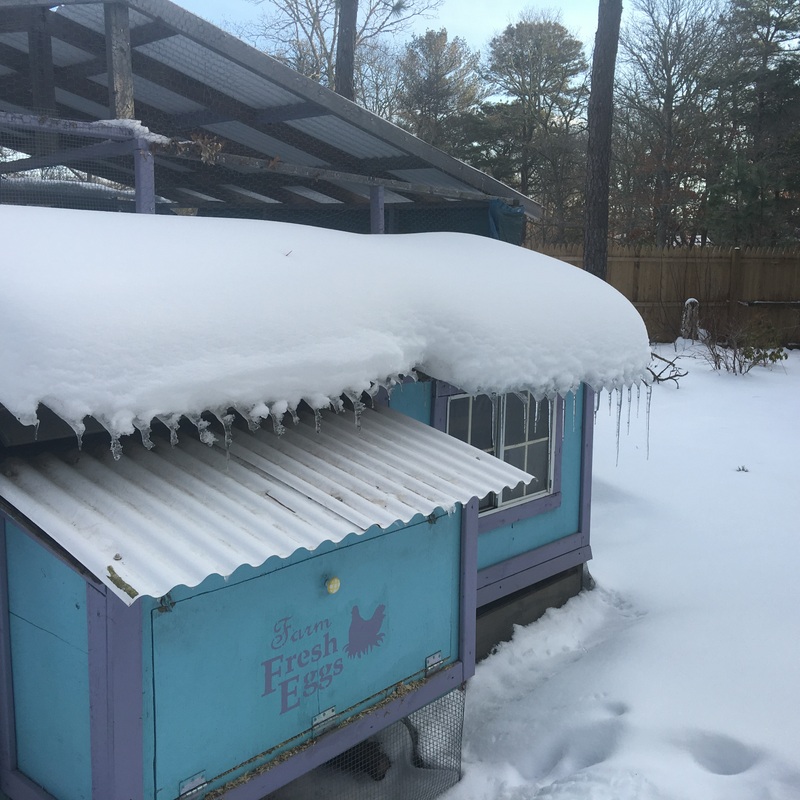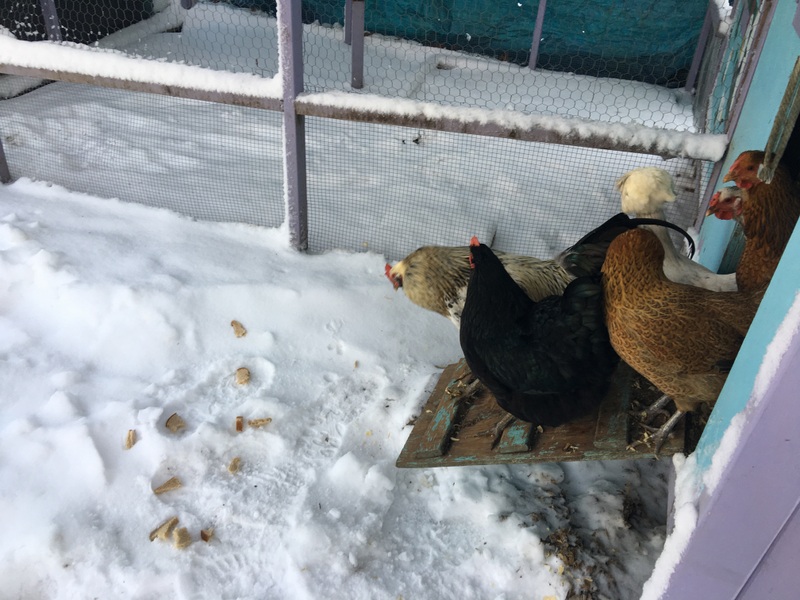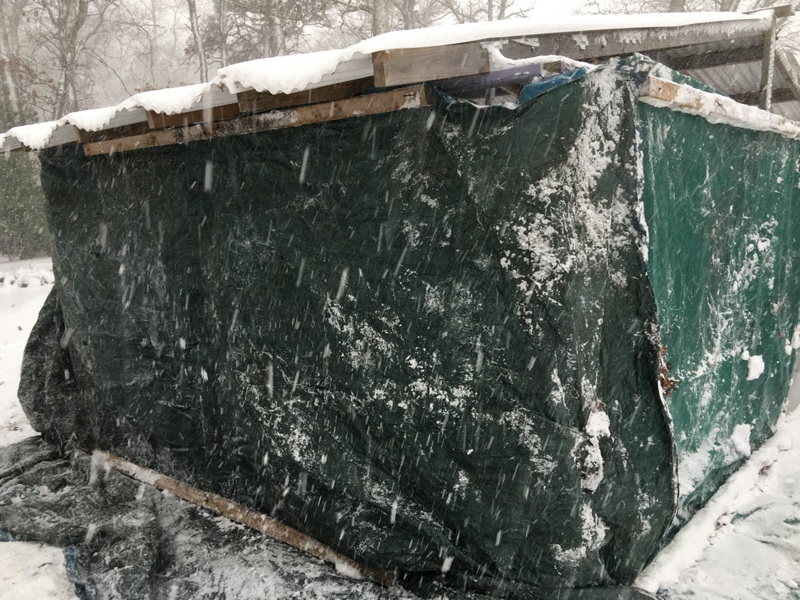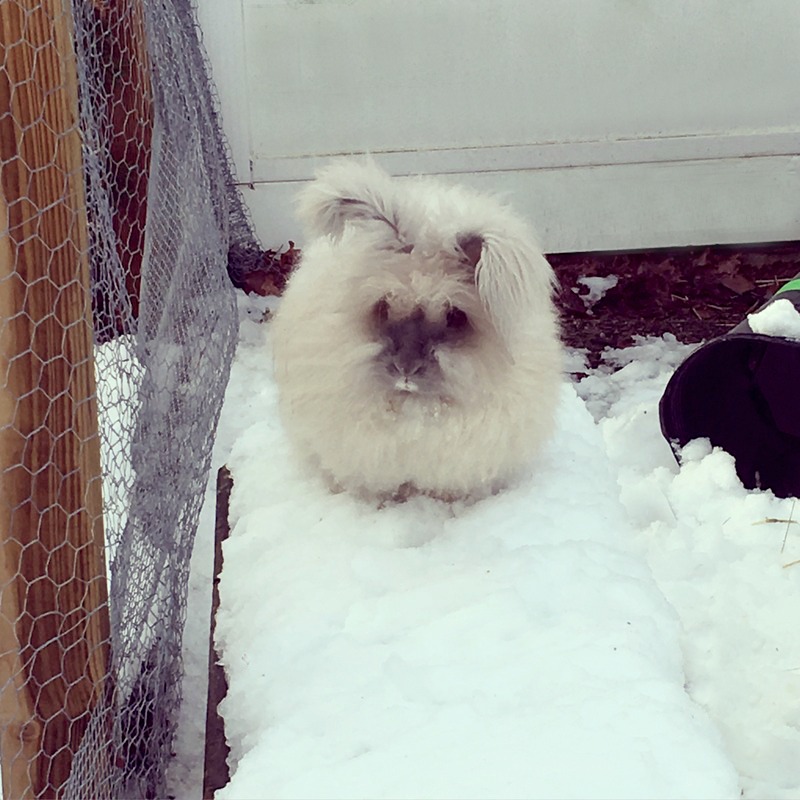---------------------------------------------------------
It’s that time of year again. Winter is nearly upon us. It’s time to start getting ready for the storms that are bound to be on the way. If you live in an area likely to get snow several times, it’s a good idea to make these preparations in early winter. Get ready in advance of the storm so you aren’t scrambling for materials, or trying to protect your animals during the storm. If you don’t often experience harsh weather, it’s still a good idea to have supplies on hand, just in case. Here is what we are doing to get our little backyard farm ready for winter weather!
Garden:
By this point in the season, I don’t have anything growing so luckily there isn’t much to do here. Click here to check out my post on putting your garden to bed after the growing season. Take a walk through the garden and make sure you don’t have any stray tools, birdbaths, pots, or decor. Loose items could either whip around in a wind storm, rust, or otherwise get damaged or do damage.
Look around your garden and yard, are there any precarious branches that could break free? Trimming them now is better than having them fall on your coop or raised garden beds later. Turn off your outdoor spigot at the source. Drain & coil the hose so that water won’t freeze in the hose, bursting it. If you have items in your garden that can not be moved, like an arbor, make sure it is properly anchored. If you have newly planted fruit or nut trees you should purchase some tree guards to wrap the trunk. It will protect the tender new tree from hungry deer who would like to strip it’s bark.

Chickens/Ducks:
Chickens & ducks are both very winter hardy animals. They have a thick layer of downy feathers to keep them warm. With a few preparation you will all sail comfortably through the winter.
The most important thing you can do in your winter preparations is make a plan for their water. Your birds will need to have constant access to fresh, liquid water. This can be challenging in the winter when the temperatures regularly dip below freezing.
To keep the water liquid you can visit the coop 2-3 times per day with fresh water. Alternately you can run an electric cord and get a water heater. When we had only chickens we opted for a metal heating base like this one. You put the water font on top of it and it would kick on when the temps dipped below freezing. We put it right in the coop on top of some cinder blocks and it worked wonderfully for the chickens.
With the addition of the ducks, we had to rethink the situation. Duck bills can’t easily fit into the chicken waterer. Now we have a heated pet bowl for the birds to share. It’s nice and deep for the ducks, and so far is working out great. If a power outage means no fresh water for your home, store a few days worth of water for your animals. You can store it in your basement or garage, in a pinch you could also collect & melt snow if available.
Make a plan for preventing frostbite – click here to read my post on frostbite in chickens
Before winter weather hits, thoroughly empty & clean the entire coop. When you refill it, add in a nice, deep fluffy layer of shavings. There will be times when the weather is just too bad and the birds will need to stay locked up in the coop. Make it as comfortable as possible. Remember if they are locked in their coop their feed & water needs to be in there with them. While cleaning, inspect for any loose boards or roof panels and secure them.

Decide if you are going to run heat in your coop. We personally do NOT have any type of heat beyond the water heater. Please be very careful if you decide to add heat in the coop. All the dry shavings and erratically moving birds bumping into things make heating your coop a real fire danger.
If your coop were to catch fire, it would be devastating to lose your whole flock. Worse, it could spread to your home or your neighbor’s home. Choosing winter hardy breeds and eliminating drafts in the coop will go a long way in making your birds comfortable all winter. If you do heat your coop, make sure you have a backup plan in case you lose power. When your birds are used to having a heated coop, then the power goes out, they will not have time to acclimate to the suddenly freezing temperatures and will likely die.
Don’t wait until the last minute to go to the feed store in the winter. Try to always keep at least a week’s supply of feed available in case you can’t get to the store. Speaking of feed, winter is when we start offering scratch daily. Scratch doesn’t have the nutritional means to replace feed but we toss out a few scoops of scratch every winter morning to help them put on a little winter weight. Make sure your feed is stored in water proof & rodent proof containers.

If you live in an area with high wind storms with lots of blowing snow, it’s a good idea to wrap the entire run in clear plastic sheeting or tarps. Having a wrapped run will cut down on drafts in the coop. It will also eliminate the need to shovel snow out of the run. Chickens don’t like walking on snow and have a hard time seeing in the blinding brightness of new snow. Wrapping the run limits the amount of time you have to lock everyone in the coop. Birds don’t like to be “cooped up” but sometimes in bad storms we lock them up to keep them safe and dry. Having a wrapped run lets them be outside in moderate storms and will keep boredom fighting to a minimum.
Finally, keep a shovel near your back door. Think about how you will get to your flock to check on them in the snow. You will need to bring fresh water and feed even when there is 2 feet of snow on the ground.

Rabbits
Many of the precautions mentioned above for chickens would go for rabbits. Make sure you have a supply of water and feed. Have a means for keeping their water liquid (this is the one we use). Wrap their hutch & run in plastic to keep the drafts out and keep your shovel handy. Click here to read my post on how we winterized our rabbit hutch.
Rabbits are also pretty cold hardy animals. Keep their bedding area full of lots of extra straw for snuggling into at night. Remember that even during harsh weather, your rabbits will still need to have exercise time. Keeping them locked away in a hutch all winter is not good for them, physically or mentally. If possible, wrap their whole exercise run in plastic or tarps. If that is not possible, you might want to consider bringing your bunnies inside for a few hours per day to run around. You could also move them into your garage or basement for the winter.







